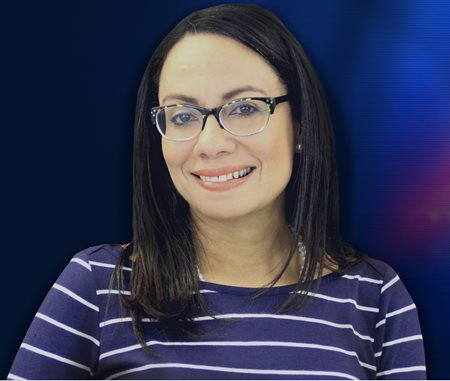
Though her time is often limited, Dr. Sonia Maldonado believes in forging meaningful relationships with her students and tries to connect with them outside of the classroom. “As teachers, [we] need to take our students under our wings,” she said. “Our students need mentoring. Our students need to get close to us.” They also need to be encouraged and empowered to conduct and publish their research.
It is with this in mind that Dr. Maldonado, an associate professor in the education department, partnered with two of her students, Victoria Araujo and Oneirys Rondon, in 2017 to write a pedagogical article exploring how educators can manifest love and respect in virtual classrooms.
The article is the culmination of a year-long journey that began when Dr. Maldonado, impressed by one of Victoria’s essays and interested in getting to know her better, asked if she would like to collaborate on a project. Victoria said yes, chose their topic and immediately got to work. She turned in a ten-page draft in two days. Excited, Dr. Maldonado secured funding via Title V - a five-year grant in support of leadership and research development for students and faculty - to finish and publish the article and invited Oneirys to join their effort. Together they wrote “
Teaching As an ‘Act of Love’ by Applying Non-Traditional Teaching-Learning Methods in Virtual Environments,” for which they incorporated Brazilian educator and philosopher Paulo Freire’s theory on the pedagogy of the oppressed.
“When you educate, you educate students to be free, to think about things critically - that’s Paulo Freire,” Dr. Maldonado explained. “We are teachers; we guide our students… we have to incorporate the experiences of our students into whatever lesson we teach in our classrooms. He believed in incorporating formal and informal experiences within the curriculum.”
Dr. Maldonado and her co-authors make the case for this approach in their article. “If this is the future of education, we have to teach our pre-service teachers [how] to show and manifest the same respect and love in those online courses,” she said. “It is possible to accommodate our teaching skills. It is possible by understanding that people are all different and that all those individualities should be taken into account when we develop the assignments, when we develop our courses, and that is respect and that’s love.”
The article was published on September 1, 2018 in
Revista Electrónica Educare (
Educare Electronic Journal), a double-blind peer-reviewed journal that receives work written in English, Spanish and Portuguese, and is edited and published by the Center for Research and Teaching in Education (CIDE, by its acronym in Spanish) from Universidad Nacional, Costa Rica (UNA); Dr. Maldonado and her co-authors chose to publish their essay in Spanish in the hopes of maximizing their international exposure. Throughout the process, both students learned how to research peer-reviewed articles and write an academic essay using APA style to fit the parameters and interests of the intended publication, among other invaluable lessons.
The experience also helped Victoria, who graduated from Hostos in 2018 with an Associate degree in Early Childhood Education, become a more confident writer.
“Academically and personally, I learned that anything you want to do can be done,” Victoria said of the experience. “I always knew I wanted to write, but I never thought that writing in Spanish was something that I could [have] done academically, [much less] professionally.” But she has, and she’s proud.
In the end, that was Dr. Maldonado’s ultimate goal. “I wanted my students to see that this was possible,” she said.